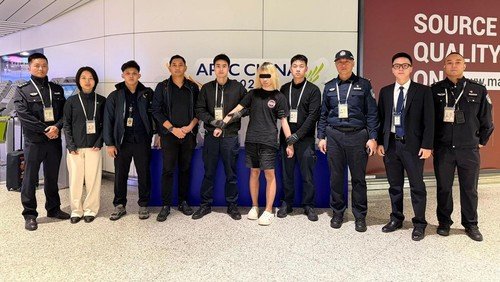
Just last Wednesday morning, around 30 expats, locals, and internationals gathered at Loko Café in Canggu. Their attention was fixed on a gridded U.S. map projected onto the café’s center screen, the states gradually turning blue and red as the 2024 U.S. election result nears by the hour.
By midday, former President Donald Trump appeared to edge out his opponent, Vice President Kamala Harris, sparking debates and hushed conversations among supporters of both parties at the event.
For this community, far removed from America’s political epicenter, the election was no distant spectacle; it carried personal and diplomatic weight, reverberating through Bali’s eclectic mix of expatriates and locals.
“I was feeling a bit nervous,” said Lindsay, a four-year U.S. expat in Bali, who requested to be identified by her first name.
“I felt a little bit of anxiety, just like a lot of people in my circle from the U.S.,” she added.
For Fritz Tastik, the organizer of the election watch party at Loko Café and a regular of U.S. election events across Asia for the past 14 years, the U.S. election has become a four-yearly diasporic ritual.
“Watching the election live, with the complexities of the American system, like Electoral College, time zones, poll closings—it’s a lot like watching a sports match,” said Tastik. “There’s real suspense, drama, and surprises with every update.”
The five-hour watch party passed.
Within 24 hours, Trump had clenched Michigan, cementing his victory for a second term.

(Photo: Fritz Tastik via Nomeo)
Emotional Reactions from Bali Expats
For U.S. expatriates living some 14,000 kilometers away from home, elections serve as moments of introspection about identity and values, even when daily life seems unaffected.
“Do I see any changes in my day-to-day life here in Bali immediately because of the election? No,” Lindsay admitted. “But I do see an atmosphere shift in certain spaces when you realize who supported Trump and who supported Kamala, as it shows where people’s values, morals, and ethics lie in certain topics.”
After living abroad for over a decade, she observed that most expats tend to keep their political involvements close to the vest. “Most people come to Bali for a change of environment, peace, and calmness,” she said.
But she noticed that the election season always brings a unique dynamic, sparking conversations about political beliefs that otherwise remain lowkey and unspoken.
For Lindsay, the election’s outcome loomed heavier when thinking about family back home.
“Thinking about my mother and friends who might be affected by Trump’s stance on abortion rights… hearing their concerns affects me because I want to support them,” she said.
“And, after all, it’s still a country I pay taxes to—a country I’m still a citizen of. It’s also a country I love and may even return to one day. So, any shift affects me, wherever I am in the world.”
Call between Indonesian President and Trump: “Your English is so Good.”
In Jakarta, the U.S. election sparked swift diplomatic engagement. Indonesian President Prabowo Subianto congratulated Trump on a phone call just days after the victory.
In a phone call on November 11, Prabowo extended his congratulations, expressing his admiration and optimism for U.S.-Indonesia relations under Trump’s leadership, and expressing his desire to meet Trump in person to “congratulate [him] personally”. Trump, in return, complimented Prabowo’s English fluency and work in Indonesia.
The brief but warm exchange came ahead of Prabowo’s state visit to the U.S. where he met the outgoing President Joe Biden (whom Trump originally ran against in the 2024 presidential bid). The visit, marking 75 years of U.S.-Indonesia diplomatic relations, focused on issues ranging from clean energy to regional stability.
Prabowo’s outreach to both opposing leader figures reaffirms Indonesia’s typical “friends-to-all” diplomatic posture.
What Trump’s Re-Election Means for Indonesia
Experts suggested that Indonesia, the world’s fourth-largest country by population and Southeast Asia’s largest, could face the rippling impacts from the U.S. election outcome.
Indonesian economists and diplomats have raised concerns of Trump’s record of a protectionist “America First” approach. During his first term, for instance, Trump withdrew the U.S. from the Trans-Pacific Partnership (TPP) and imposed tariffs on Chinese goods—actions that disrupted global trade and strained U.S. relationships with its allies.
Trade ties between the U.S. and Indonesia have remained steady, but Trump’s economic policies could create new tensions.
“Trump has a history of targeting China with tariffs, which could put pressure on Southeast Asian countries like Indonesia that have strong trade links with China,” said Suzie Sudarman, Director of the Center for American Studies at the University of Indonesia, for a BBC report.
For Indonesia, which exports a wide range of goods—from palm oil to textiles to the U.S.—even minor shifts in trade policy could have a substantial economic impact.
However, some experts caution that the effects of a U.S. election on Indonesia’s trade are often overstated.
“Trade and investment have been growing modestly over the years, regardless of who’s in power in Washington,” said Shinta Kamdani, Vice Chairwoman of the Indonesian Chamber of Commerce and Industry (KADIN), for a BBC report.
“We expect this trend to continue, though tensions could rise if Trump takes a more aggressive approach toward trade protectionism.”
Climate Policy and Environmental Concerns
Perhaps the most pressing concern for many Indonesians, particularly those in Bali, is Trump’s stance on global climate change. His track record—withdrawal from the Paris Agreement, rollbacks of environmental protections, and unabashed support for fossil fuels—signals a second term poised to undo years of progress.
In his victory speech, Trump called oil and gas “liquid gold,” highlighting his intention to double down on extraction policies that prioritize profit over the planet.
This return to an America-first approach poses challenges not just for Indonesia, but for the global climate agenda. As an island nation vulnerable to rising sea levels and extreme weather events, Indonesia’s own climate policy, including its goal of reaching net-zero emissions by 2060, faces potential setbacks. Bali, with its thriving tourism industry, relies heavily on its pristine environment, and any damage to that ecosystem could have severe consequences.
With the COP29 summit just days away, world leaders are set to discuss critical climate funding for vulnerable nations.
Mohammed Chahim, a member of the Dutch delegation to COP29, remains hopeful that Trump’s appointment shouldn’t diminish ongoing climate talks. He pointed out that Trump’s past withdrawal from environmental agreements was more “symbolic than effective,” as American NGOs and lawmakers remain engaged in the COPs, Chahim argued.
“With Green technologies now more affordable and the reduction of emissions increasingly linked to financial benefits, it is harder than ever for Trump to resist the green agenda entirely,” Chahim said.
The Bigger Picture: Life for Expats Under Another Trump Term
As Bali’s expat community processed the news of Trump’s victory, there was a shared sense of contemplation about what a second term could mean, both personally and globally.
For Lindsay, the fear is less about immediate political changes and more about the broader cultural and social ramifications.
“I think, unfortunately, Trump incites a lot of violence,” she said, pointing to how his rhetoric emboldens racist and homophobic views. “He creates an atmosphere where people with those views feel comfortable expressing them openly—something other presidents didn’t condone.”
Fritz Tastik, reflecting on the geopolitical ramifications, expressed concern about the U.S.’s standing in Asia.
“Living in Asia, I’d rather be in a place where America is seen as a friend and partner,” he said, stressing the importance of the U.S.’s relationships in the region. “When U.S. policies lean isolationist, it hurts America’s standing here.”
As the dust settled after the U.S. election, it became clear that global political shifts—no matter how distant from Bali’s palm-fringed shores—continue to reverberate through the island. Housing communities of expats from all around the world, Bali has become a global microcosm where the stakes of global politics are felt with surprising immediacy.









